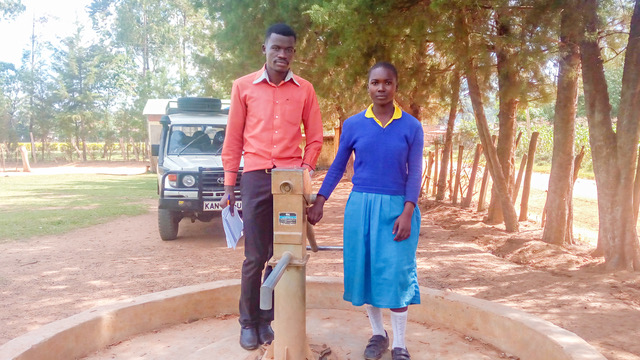The Lucky Ones

Together, we are creating a world where 14-year-old students will no longer believe they are “lucky” if they have access to safe water or if their well keeps working. They’ll know it as something they can count on.
Until 2016, Carolyne Munyasi, a 14-year-old student at Lugusi Primary School, had no idea what it meant to have clean water at her school. She and her 750 classmates would have to walk past a broken well at her school to an unsafe water source over a kilometer away. These walks for dirty water took time away from studies, often resulting in stomach illnesses and absences.
That year, our supporters funded work towards a rehabilitation of the school water well, and the implementation of a holistic health and sanitation program. When safe water flowed from the new school water project everyone at the school was thrilled.
“This source will be of great help to the school and community at large,” head teacher Shem Maumo said.
We knew this could be true. This is what water does. But, we knew that the day the water project was installed was just the beginning, and the school deserved, and the well needed, ongoing support and service.
A hand-pump, like any moving, mechanical device, needs maintenance or it will break down.
The hand-pump wouldn’t magically keep working. None do.
The hand-pump that Carolyne and her classmates used was no exception. But, as we continued to support and help the school maintain their pump, we found that it needed maintenance and repair far too often.

Feeling Lucky? Broken pumps are so normal in Western Kenya that students like Carolyne think it’s luck that keeps them working. Our community of generous supporters are proving to her that clean water can be counted on.
By collecting and analyzing the data on this well and others in the region, we discovered that a small part in our hand-pumps in Kenya was prematurely failing. We began to see a trend across our entire program.
We found that frequent repairs were needed due to the breakdown of a poor quality rubber u-seal that is a standard part in all wells across the continent. They were failing so often that some of our wells required costly service visits four times in a year.
What we uncovered was a significant quality control issue within the nationally approved, standard hand-pump itself that was most likely affecting all wells in the entire region.
We immediately went to work with our local teams towards a solution. We found a better part. A slightly more expensive but reliable, plastic u-seal was available (but not often used) in local markets. We upgraded these unreliable u-seals in all 271 of our wells and reports of premature well failure immediately stopped.
During one of our recent revisits, we met Carolyne and her classmates again. Carolyne shared, “I have enough time to carry out my studies now, especially during this time as I prepare for my final exams later this year. I am among the lucky ones compared to the candidates of the past years. They were always out sick and less time was used for their studies.”
“Among the lucky ones.”
Together, we are creating a world where 14-year-old students will no longer believe they are “lucky” if they have access to safe water or if their well keeps working. They’ll know it as something they can count on.
It took time and a lot of questions to arrive at the solution. And there was an immediate cost. However, this investment has already saved hundreds of personnel hours and thousands of dollars in fuel and repair vehicle maintenance. Most importantly, it has helped restore community confidence in hand-pumps – and kept the economics of safe water flowing into the lives of those who rely on it.
Your generosity is world-changing. Check out our 2018 Impact Report to learn more about the lives being transformed through your support of clean water.
Home More Like ThisTweet